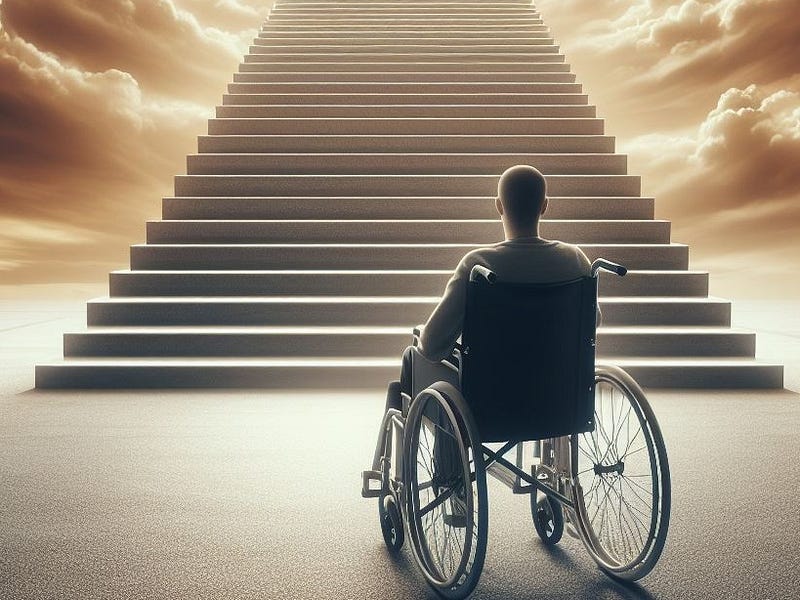AI Doomers are Hurting the Disabled
How blind fear about AI is harming our most vulnerable people
How blind fear about AI is harming our most vulnerable people
Have you been thinking about how AI is changing the world?
As an AI professional, I’d say it's a good idea to be thinking about it.
AI has potential to transform humanity, in some good ways, some not.
If you are thinking about AI, that’s a great thing.
AI development is moving fast, and it can take a lot of work to keep up with what is going on.
Does that mean we should pause or stop all AI development?
Do you feel fearful about AI, or even angry about it?
Some people call this ‘AI Doomerism’ — people who are so worried about AI, they believe AI is an existential risk to humanity.
AI doomers want to pause or stop all AI research, to help us stay safe.
But do you think this is a good idea? A sensible precaution?
Or is this a really bad idea?
Rather than protecting us, could stopping all AI research end up harming some of the most vulnerable people in our society?
Do you understand the needs of others?
One of our greatest weaknesses as humans is our lack of ability to understand things from a different perspective.
And one of our greatest strengths as humans, is our capacity for empathy, to understand someone who has a very different perspective to us.
Do you have a disability of some kind? Most people don’t.
Most people struggle to see things from a disabled person’s perspective.
Would you agree?

People don’t tend to notice things like the lack of wheelchair access to certain buildings…
…or how a blind or partially sighted person might find it difficult to get around an awkward place where we walk easily without a thought…
Do you know what I mean?
That’s true for most of us who don’t have a disability, unless, of course, we have more understanding like you know someone who has a disability.
Let’s be honest — most of us, me and you, can struggle to fully appreciate and consider the needs of the disabled.
AI’s huge potential to help the disabled
When you think about AI what do you think about?
Do you worry about AI taking your job, for example?
That’s something many people worry about.
But have you considered how AI might be able to help others, such as disabled people?
A recent article in Axios Assistive Technology: AI’s Next billion-person market reported on some of the latest developments in AI for helping disabled people.

Assistive technology is any tool, device or software that helps a person or their carer overcome the challenges of a disability.
Speech recognition and computer vision are among the most popular categories of AI-powered tools to help people with disabilities.
Assistive technology can be life-changing for people living with a disability and will be essential in supporting our aging population as healthcare costs increase.
The World Health Organisation estimates that 1 in 6 people, or 1.3 billion globally, live with at least one “significant disability”.
So, Assistive AI technology for the disabled has great potential for improving people’s lives.
And up to 3.5 billion people will need assistive AI products by 2050.
The Axios article also reports some of the latest assistive AI products at the recent CES conference.
These included:
A Romanian startup, dotLumen, offers a headset it calls “.lumen glasses,” designed to replace the need for a guide dog or white cane. The company hopes to begin selling it as a registered medical device in the U.S. and Europe later this year.
OrCam’s MyEye device magnetically clips onto regular glasses and offers prompts to the wearer — it can recognize stored faces, describe what it’s looking at and read text aloud.
Ara Strap uses both ultrasound and light-based lidar sensors to scan its environment. Users strap it to their chest and receive alerts about three levels of risk in their path — and they say they find it allows them to move faster than with alternative supports like white canes.
Microsoft offers a Seeing AI app, which is a talking camera for the blind, while Google’s Project Euphonia trains speech recognition algorithms in non-standard speech, helping people with speech difficulties express themselves and use voice-activated devices.
“NeuroSkin” trousers stimulate patients’ legs via electrodes controlled by artificial intelligence — an advance that could help people with a range of mobility difficulties
These applications of AI have great potential to help empower disabled people, alleviate suffering & social isolation, reduce healthcare costs, and improve the lives of billions of people across the world.
How AI doomers are harming society
Is every use of AI positive for society?
Of course not, some applications of AI could be harmful.
But does believing ALL AI is harmful to society make any sense?
One of the most prominent AI Doomers is Max Tegmark, who said:
AI is a cancer which can kill all of humanity.
Does this seem a bit over the top to you? A bit hyperbolic?
I find Tegmark’s statement ridiculous, deliberately scaremongering, and designed to inflame people’s worst fears.
There is no evidence to support his statement, it’s all speculation, as he will admit under questioning, it’s just his worst fears about AI.
But fears are not the same thing as facts and evidence.
I find this an appalling statement by a scientist who should know better, who should know the difference between evidence and wild speculation.
Tegmark also organised a petition for all AI labs to pause all research for at least 6 months.
Tegmark and other AI Doomers don’t seem to care if this stops the development of AI to help many good uses, such as assistive AI technology for the disabled.
Pausing or stopping all AI development would be very harmful to improving the lives of some of our most vulnerable people in society.
Growing AI knowledge is better than growing AI fears
Assistive AI technology for the disabled is just one great use case, many other uses of AI have other beneficial effects on society.
For example, AI can now diagnose heart disease more accurately than human cardiologists.
I have written previously about how AI-driven cars are becoming safer than human drivers, and have the potential to save millions of lives from terrible accidents.
The Truth About AI-Driven Cars: They Are Not the Enemy — We Are
If you want safer roads we may need to face some uncomfortable factsai.gopubby.com
But AI doomers like Tegmark want to scare you into stopping all AI development, even if it can help save more lives and benefit humanity.
They just don’t seem to care about that.
AI Doomers seem to really struggle to understand the needs of others about AI, such as the needs of the disabled.
They seem to want to make everyone believe AI is an existential threat to humanity, despite having no evidence for this.
Does that make any sense to you? It makes no sense to me at all.
Fear or anger seems to be the overriding motivator of the AI Doomers.

But when you stay very fearful or angry, do you make the best decisions?
Is that the best place for you to understand a complex situation or for you to think carefully & rationally?
I think you know the answer, is no.
People that want to scare you, don’t want you to think for yourself.
Andrew Ng, a pioneer in AI research and leading thinker said:
The world has many existential risks, but AI is not one of them.
AI is the very thing we need to help us with many challenges & threats.
We need to continue to support AI research, so it can help save and improve the lives of billions of people, including the most vulnerable and disabled in our societies.
We need to be able to see things from the perspective of others, and empathise with them and their needs, to be able to see the bigger picture.

But what’s your perspective? Do you agree? Do you think we should stop all AI research even if that causes more suffering to the most vulnerable? Or do you have a very different perspective?
I’d love to know what you think whatever that is, let me know in the comments and let’s continue this important discussion about AI research & protecting society.
I use AI as part of my writing process, as a tool to help improve my own writing and more. Like to learn how to use AI to help your writing & more?





What do you think about the issues raised here?
Let me know in the comments I’d love to know 🙂
Fear-driven narratives often overshadow the incredible potential AI holds for inclusivity and accessibility, especially for those who are marginalized.
Instead of framing AI as an existential threat, let's focus on ensuring its responsible development to uplift everyone—especially the most vulnerable in society.